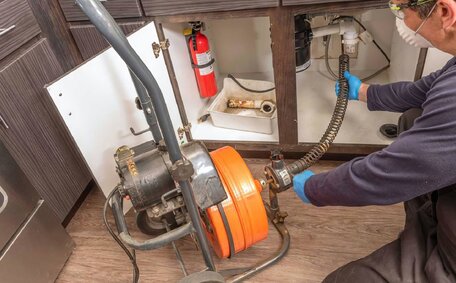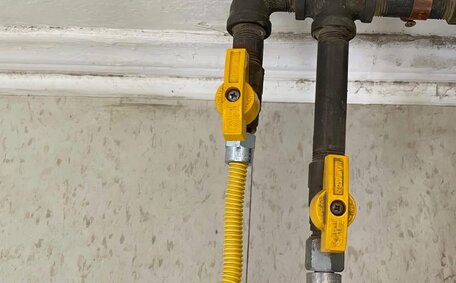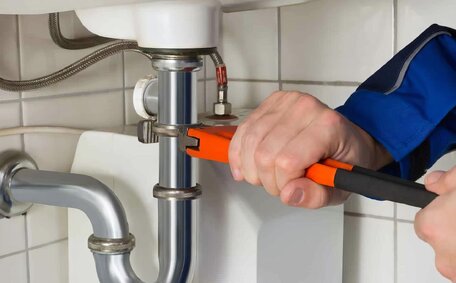What is Pipe Relining and How It Works
Pipe relining is a sophisticated method that rejuvenates aging drain pipes from within, tackling prevalent blockage issues. This technique inserts a flexible epoxy resin liner into the existing pipe structure, curing to form a smooth, seamless inner pipe resistant to tree roots.
Pipe relining, being a cost-effective drain repair solution, eliminates the need for costly and disruptive excavation work to install a new pipe. Trenchless pipe relining involves minimal landscape disruption with only minor excavations needed at strategic access points. The existing pipe structure stays intact during relining, safeguarding against leaks, corrosion, and root intrusions, while also addressing blockages.
The full pipe relining process involves:
- A drain camera inspection is performed to pinpoint damage within the pipes
- Pipes are thoroughly cleared using high-pressure water jetting
- Inserting a felt liner soaked with epoxy resin into the pipe
- The inner lining is cured and hardened using air, water, or steam
- Reopening service lines once cured
Choosing pipe relining over traditional replacement avoids extensive repairs and efficiently resolves issues like joint leaks and root intrusions in sewer pipes. As one of the benefits, pipe relining has a life expectancy 50 years or more, serving as an effective strategy for maintaining your drains, negating the need to excavate and replace an entire section of pipe.
Pipe relining minimises disruption to landscapes and your property, rendering extensive excavation unnecessary and offering an efficient way to fix pipes.
Typical Process and Timeline for Pipe Relining Projects
Pipe relining services often boast same-day completion, reducing impact on your property by completing the project within a workday.
Once your plumber completes the initial CCTV inspection of your pipe, the typical pipe relining process follows these key steps:
- High-pressure water jetting – This cleans the interior pipe walls, preparing them for the liner.
- Installation of liner – A felt liner impregnated with epoxy resin is inserted at designated access points
- Curing with steam – Liner hardened and formed to pipe walls with steam for 2 to 4 hours
- Service reconnections – Any service lines reopened once liner is fully cured
- Final CCTV inspection – Ensures smooth installation and tests integrity
Small access pits may be dug as traditional pipe joints can be accessed to feed in the liner and for steam, but there’s no need to dig trenches or demolish structures for relined pipes.
From initial inspection to project completion, most pipe relining is finished within a single day, typically within 6 to 10 hours.
Pipe relining requires minimal disturbance, safeguarding your piping system and alleviating the need for extensive disruption to gardens, yards, and driveways.
Minimal Excavation Preserves Landscaping
The benefits of relined pipes, replaced with new materials, over more disruptive traditional strategies include requiring minimal excavation and digging. There’s no need to dig up large areas because only small access pits are necessary around pipe joints to feed the epoxy liner into your pipes, replacing the old one.
Pipe relining is beneficial as it preserves landscaping and avoids damaging gardens, trees, driveways, and underground utilities. It eliminates the mess, disruption, and costs involved with tearing into your garden, yard or driveway to replace pipes.
rather than digging two-foot trenches across the length of a pipe run, relining forms a pipe within existing structure through current pipe access points. For the underground piping system, a small hole allows the new pipe lining to be inserted into damaged sections, hence preserving your infrastructure’s integrity. This tiny access point preserves the integrity and appearance of landscapes.
So if you require your pipe relining to be done with the utmost efficiency and minimal disruption, this approach is the ideal solution.
Access Points and Protecting Vegetation
Technicians performing pipe relining meticulously safeguard vegetation and landscaping. They identify existing access points, planning entry locations to avoid damage.
For underground pipes, technicians locate an area of soft soil or pavement. A small 30cm access pit is dug to access pipe joints, minimising disturbance to plant roots. For indoor pipes, entry points like maintenance openings behind walls or under sinks are used.
Access areas are protected with steel plates and rubber mats to prevent marks on driveways or floors, a far less invasive approach compared with traditional methods. The sites are fully restored after relining, returning your property to its original state without the need to dig up the landscape.
Pipe relining emphasises vegetation protection and careful planning of access points, thus maintaining the integrity of your outdoor spaces.
Restoring Property to Original Condition
Once pipe relining is complete, technicians restore your property to its original state. All work zones are tidied up, with any resulting marks or blemishes fixed. Waste material and equipment is removed, and sites reinstated to their former condition.
After completion, anticipate the following:
- Access pits filled in and repaired
- Flooring, driveways and pavers checked and restored
- Walls repaired and redecorated where internal pipe access was needed
- Gardens, lawns and plants replaced
- Rubbish, equipment and materials cleared away
Our experienced plumbers guarantee full restoration of your property, efficiently addressing all your plumbing needs. Gardens will be revived, structural repairs completed and surfaces cleaned. It’s all part of our seamless service to sustain your plumbing system.
Promptly after completion, it will appear as if no work has been done, exemplifying pipe relining’s effective repair capabilities. And you’ll have a completely new one with fully renewed plumbing infrastructure completed with minimum fuss.
Adhering to Codes with Durable Materials
In the plumbing industry, it is essential that all materials and pipe relining technology processes adhere to relevant building codes and standards. This ensures safety, reliability, and longevity of any plumbing infrastructure.
Pipe relining employs epoxy resin, ensuring the renewed pipes are resistant to corrosion, abrasion, impact and chemical exposure, all without the need for full replacement. Once cured, it creates a robust barrier inside pipes, enhancing water flow with its excellent compressive strength and flexibility.
We ensure compliance with the latest Sydney Water requirements, Plumbing Code of Australia, and standards such as AS/NZS 4130 and AS/NZS 2566.1. We are committed to keeping abreast with regulations and best practices.
By using industry-approved methods and materials certified to handle hot water, drainage and gas systems safely for decades, we provide compliant, high-quality and long-lasting pipe repairs.
Our pipe relining Sydney team, serving the Northern Beaches and beyond, keeps fully trained and licenced, giving customers confidence in the standard of our installations across the Abbotsbury area.
What to Expect During a Pipe Relining Project
A pipe relining project aims to minimise disruption, even as it addresses the common causes blocked within your pipes, but there will still be some temporary changes while work is underway.
You can expect:
- Technicians accessing plumbing systems through strategic entry points like manholes or small, planned pits, without significant excavation
- High-pressure jet washing equipment used to clean pipe interiors in preparation for the new liner
- Presence of specialised pipe relining equipment and steam generators onsite
- Potential bypass pumps to maintain drainage during works
- Possible temporary interruptions to hot water supply while pipes are accessed
- Tidying, cleaning and removal of all tools and materials after completion
While pipe relining, which essentially involves fitting a pipe within old one, requires equipment and technician access, most impacts are brief and rectified fully once the project is complete. The aim is to maintain the flow of your daily activities undisrupted, despite essential plumbing repairs.
With advance notice of any planned changes to your home’s water supply, you can expect a smoother experience than traditional methods while pipe relining work takes place. Any intrusions into your space or routine will be as limited as possible throughout.
Quantifying Disruption vs Replacement
When comparing strategies, it’s evident that pipe relining more effectively minimises disruption than pipe replacement.
The traditional replacement process requires excavating trenches up to two feet deep across your entire property - often extending 30 metres or more. This damages landscaping and can threaten the integrity of your outdoor spaces, taking days to weeks to complete. Expect costs around $250 per linear metre.
Repairing damaged pipes via pipe relining is completed through a single access point in under a day, being a more cost-effective solution without the need for extensive groundwork. For a 30 metre pipe, there would be just one small entry pit dug, preserving gardens and structures within old one. At around $130 per linear metre, it proves to be a cost effective solution compared to other methods.
In terms of landscape disruption, full replacement means:
- 30+ metres of trenches dug
- Driveways, patios and walls sometimes need to be dug up
- Mature trees and planting removed
- Yards left muddy and damaged
With pipe relining, there is:
- One 30cm access pit dug
- No lasting damage to structures or services
- No disturbance to tree root systems or planting
- Full site restoration included
Pipe relining saves over $3,500 for a 30-metre pipe and significantly reduces disruption to your lifestyle. This avoids weeks of upheaval, safeguarding the integrity of your property.
Getting Quotes and Asking the Right Questions
When evaluating pipe relining services, seek multiple quotes and ensure you understand the following crucial details:
- Project timeframes and work scheduling
- Number and location of access points needed
- Processes taken to protect walls, floors and outdoor areas
- Whether gardens and landscaping will remain fully intact, particularly when working near your sewer systems
- If driveways will need to be dug up or removed
- What guarantees they provide on materials and labour
- If they adhere to all relevant building codes and standards
- How long the pipe relining solution will last
At Abbotsbury Plumbing, we offer comprehensive support for non-invasive pipe relining solutions. As specialists working in Abbotsbury and across Sydney, we are equipped to handle blocked sewer repairs and explain how we can solve your plumbing problems with minimum impact to your property.
Connect with us today on 1300 349 338 or jobs@abbotsburyplumbingservices.com.au to learn more.






